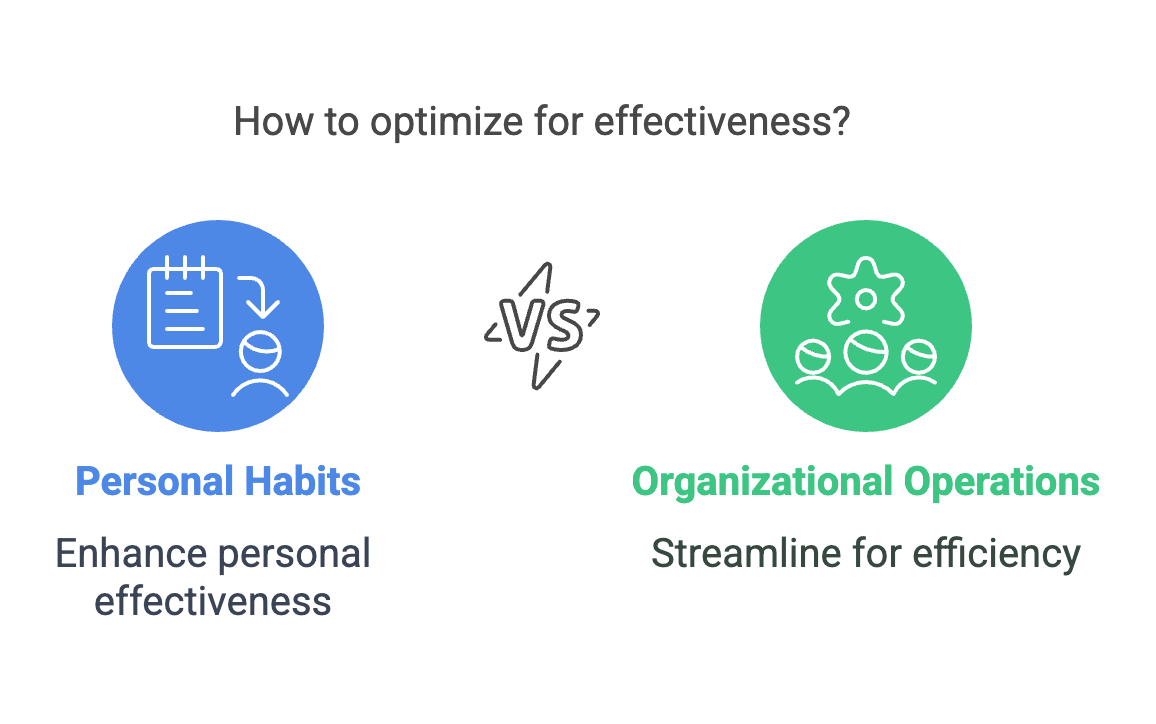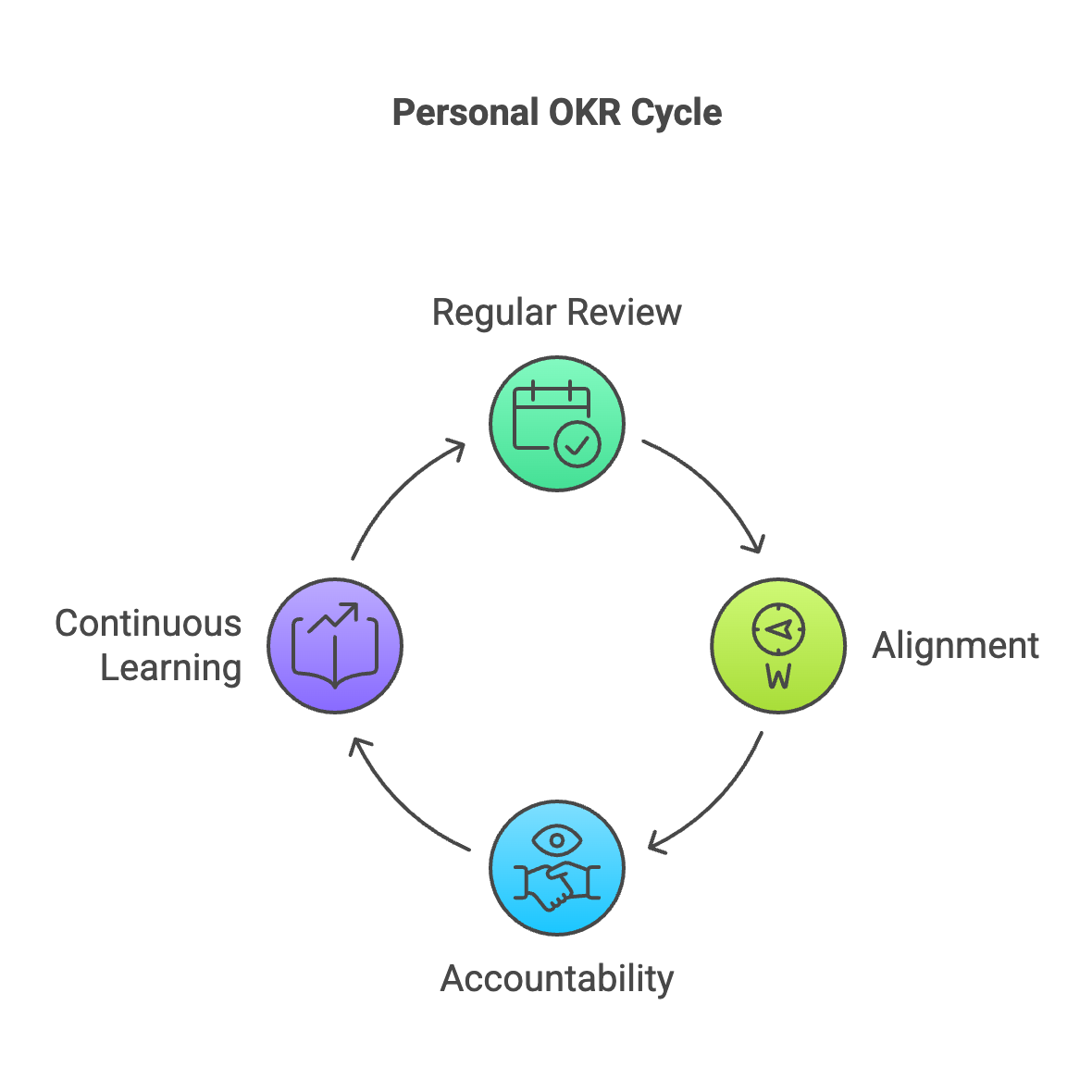In today's fast-paced world, the pursuit of personal and professional success often feels like a complex puzzle. Individuals and organizations alike constantly strive to improve and grow. Enter OKRs, or Objectives and Key Results, a methodology originally popularized by tech giants like Google and Intel. While OKRs have been widely adopted in the business world, their application to personal development is less explored. In this article, we propose that individuals harness the power of OKRs to plan and achieve their personal and professional goals effectively. We'll delve into the concept of OKRs, discuss how to set clear personal objectives and key results, and explore actions for success. Additionally, we'll draw parallels between personal habits and organizational operations, highlighting how both can benefit from continuous improvement and strategic projects.
What are OKRs?
OKRs, which stands for Objectives and Key Results, is a goal-setting framework that has revolutionized the way organizations approach their objectives. At its core, an Objective is a clear and ambitious goal that defines what an individual or organization wants to achieve. Key Results, on the other hand, are specific, measurable outcomes that indicate progress toward the Objective. The power of OKRs lies in their simplicity and focus. They force individuals and teams to prioritize and align their efforts to achieve meaningful goals.
Setting Clear Personal Objectives and Key Results
To apply OKRs effectively in your personal and professional life, start by defining clear Objectives. These should be aspirational and motivating, challenging you to reach higher. Whether you're aiming for career advancement, improved health, or personal growth, set Objectives that inspire you.
Next, break down these Objectives into Key Results. These should be specific and quantifiable milestones that indicate progress toward your Objectives. For example, if your Objective is to improve your physical fitness, Key Results could include metrics like running a certain distance, lifting a specific weight, or reducing body fat percentage.
Actions for Success
The Personal Habits vs. Organizational Operations Analogy
To truly understand the power of OKRs in personal development, let's draw a parallel between personal habits and organizational operations. Just as businesses execute their activities through operational processes, individuals perform their daily tasks through personal habits.
Think of your habits as the operational backbone of your life. Just as a company seeks to streamline and optimize its operations for efficiency, you can enhance your habits for greater personal effectiveness. Whether it's time management, communication skills, or self-discipline, improving your habits can significantly impact your success.

Habit Improvement
Once you've identified the habits that are essential to achieving your Key Results, it's time to focus on habit improvement. Take a deliberate and systematic approach to changing habits that may be hindering your progress. Use the principles of behavior change to your advantage.
For instance, if your Key Result is to read more books to expand your knowledge, make it a habit to read for a set amount of time each day. Start small, gradually increasing your reading time. Track your progress and celebrate your successes along the way. Over time, this habit will become ingrained, contributing to your overall personal growth.
Strategic Projects
In addition to habit improvement, personal success often requires the completion of strategic projects. Just as organizations undertake projects to achieve specific outcomes, individuals can embark on personal projects to fulfill their Objectives.
Identify the projects that align with your Objectives and Key Results. These projects should be well-defined, with clear goals and timelines. Whether it's launching a side business, learning a new skill, or renovating your home, each project should contribute to your overall success.
Tips for Maximizing Personal OKRs and Actions
Regular Review: Like in the corporate world, regular review and adjustment are crucial for personal OKRs. Set aside time at regular intervals to assess your progress, adjust your Key Results if needed, and celebrate your achievements.
Alignment: Ensure that your personal OKRs align with your values and long-term vision. This alignment will provide you with the motivation and determination needed to stay on track.
Accountability: Share your personal OKRs with a trusted friend or mentor who can hold you accountable. Having someone to check in with can be a powerful motivator.
Continuous Learning: Just as organizations adapt and learn from their experiences, be open to learning from your successes and failures. Adjust your OKRs and actions accordingly to keep growing.

Key Takeaways
In summary, adopting the OKR methodology for personal and professional success involves setting clear Objectives, defining measurable Key Results, and taking deliberate actions. By drawing parallels between personal habits and organizational operations, individuals can enhance their effectiveness through habit improvement and strategic projects. Remember, the pursuit of success is a continuous journey of growth and improvement, both in your personal life and in the business world.
So, why wait? Start applying the principles of OKRs to your personal and professional life today and witness the transformative power of clear goals, measurable results, and purposeful actions. Embrace the OKR framework, and you'll be well on your way to achieving the success you've always envisioned.